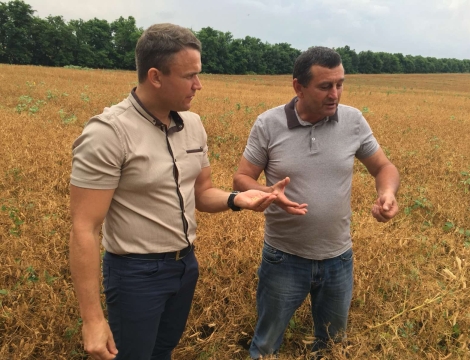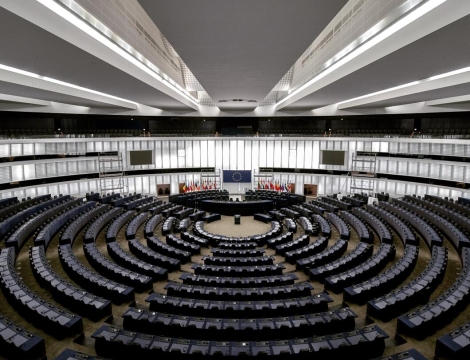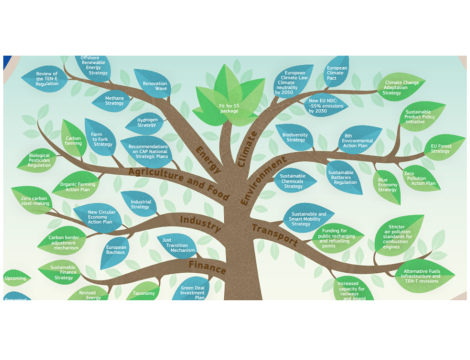Pioneering Sustainable Grain Trading: The Journey of Spartac Chilat and Prograin
This article is part of a series of interviews by Anders Invest's Food & Agri team. Here, we look at people and activities from our portfolio companies. In this interview, we meet Spartac Chilat, the founder and CEO of Prograin Organic. A company that operates in the field of cultivation, processing, storage, trading and export of organic grains, seeds, and pulses in the Republic of Moldova. They were the first company to introduce organic food and agriculture in Moldova and help farmers transition from conventional to organic practices.
History of Spartac and Prograin
Spartac has been involved in the food and agriculture industry since graduating from the Academy of Economic Studies of Moldova in 1997. Throughout his career, he held several positions with agricultural companies; focusing on the distribution, logistics, and trading soybeans, fertilizers, and grains across Moldova. What truly captivated him was the concept of uniting farmers and integrating them into a cooperative network. Leveraging his industry knowledge and network of distribution partners, buyers, and farmers, Spartac identified a promising opportunity in the grain trading industry in 2012, leading to the establishment of Prograin. Together with four former colleagues, he started his new venture.
Having an in-depth understanding of conventional farming, Spartac was aware of its flaws. Fueled by a conviction to harness the full potential of Moldova's fertile landscape, he observed that ordinary operators lacked respectful land treatment, leading to reduced long-term fertility. The increasing use of chemicals and fertilizers deteriorated the ground and raised concerns about public health. Furthermore, competing in conventional farming against larger operators who used cost-leadership strategies posed obstacles with low margins, often undermining and eliminating smaller players. Therefore, Spartac recognized to take a more holistic view and initiated a transition to organic production in 2015 with Prograin. During this time, he met Dirk and Michel, his first Dutch connections, who were crucial in establishing the foundation for a later partnership with Anders Invest.
"Prograin is deeply committed to aiding farmers by providing input supplies, certification, technological support, grain handling, logistics, legal assistance, and other essential activities. These endeavours, although crucial, require upfront investments. A significant challenge to note is that 80% of farmers struggle to make these initial investments without a direct return. This calls for a shift in mindset. Due to the sustainability aspect of our business, it's crucial to transition from short-term thinking to a long-term approach. While an investment today might take longer to realize profitability compared to conventional farming, with patience and understanding, it will ultimately become highly lucrative. This is not just due to enhanced soil health but also because of the opportunity for premium pricing.
For a truly sustainable future, collaboration is vital. As we've always believed, "You cannot be sustainable if your partners are not sustainable." Together, with a united vision, we can ensure that both the land and our farming partners thrive."
Anders Invest saw this niche market's favourable business climate and high growth potential in Moldova. Spartac explains: "Anders Invest brings their extensive expertise in food and agriculture, along with a long-term vision. We knew this was the perfect opportunity to start making a difference within the industry."
Unique Value proposition of Prograin
Prograin operates throughout Moldova's entire value chain of organic grains, seeds, and pulses. "We are dedicated to supplying high-quality organic products with complete traceability, ensuring a seamless journey from the field to the consumer's plate."
Prograin ensures efficient collection and storage logistics and has invested in state-of-the-art organic processing lines. This commitment to infrastructure development allows Prograin to access organic grain markets effectively. They are Moldova's first IFS (International Featured Standards) certified company. Prograin's commitment to quality control ensures that products meet rigorous standards before export. They promote various crops, including spelt, wheat, oat, sunflower, corn, sorghum, mustard, green pea, yellow pea, soybean, rye, beans, alfalfa, and buckwheat. On top of that, they started the Moldova Organic Value Chain Alliance (MOVCA). An NGO that supports the growth and success of organic agriculture throughout Moldova and actively advocates for subsidies and pro-organic policies with the government.
A bright future ahead
The future of Prograin appears promising as organic production gains importance in the agricultural landscape. Spartac envisions significant growth driven by crop rotation, regenerative farming, and subsidies for green initiatives. The company invests in soil fertility programs to boost yields and increase profitability. Growth rates of more than 10% per year are anticipated as Prograin continues to navigate and excel in these different facets of the business.
In conclusion, Spartac Chilat's journey in the food and agriculture industry has culminated in the establishment of Prograin, a pioneering force in Moldova's agricultural landscape. His vision of becoming a market leader and fostering a cooperative network among farmers has driven Prograin's success and has only just started. With the strategic partnership with Anders Invest, Prograin has a bright future, aiming to expand its reach and connect with more farmers while ensuring high-quality products and complete traceability from field to plate.




